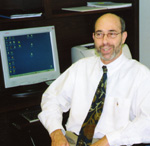FRD director cites growth, admin.
support
Robert I. Pozner, Ph.D., here from the Office of Technology Development
at the University of North Carolina at Chapel Hill, has taken the helm
at the Foundation for Research Development to serve as director of
technology transfer and as the foundation’s interim executive director.He replaces Ken Roozen, Ph.D., who for eight years nurtured the foundation from its birth to become a driving force in bringing MUSC technology to public use.
 Dr. Robert Pozner
Dr. Robert Pozner“This is where I want to be,” Pozner said during a get-acquainted interview last month as he settled into his office at Cannon Park Place. “The operation at Chapel Hill is practically self-sustaining and with everything in place there, I would have had a maintenance role. I’m not built that way.” He said that MUSC’s growth in research, the support and commitment from the university’s administration and the clear opportunity to build on the groundwork Roozen has in place influenced his decision.
From his recent position as senior associate director of the UNC Office of Technology Development, from similar positions at North Carolina State and the Triangle Universities Licensing Consortium and from a decade of experience in marketing and technical management in the corporate sector, Pozner brings with him a momentum that promises to enhance MUSC’s position among research universities nationwide.
Pozner said his primary activities will center on licensing MUSC technology and intellectual property to existing companies, the creation of start-up companies, and nurturing research relationships with the corporate sector and with other universities and research centers, all with the aim to get university technology commercialized for the public’s and the university’s benefit.
Beyond this, MUSC has an opportunity to be at the forefront of using its technology for social good, Pozner said. Describing a trend that he says is picking up steam, Pozner said he would like to use intellectual property to treat orphan diseases and diseases in developing countries. Orphan diseases and the diseases that can paralyze nations struggling to develop their economies hold little promise of return on investment, but offer huge rewards in the relief of suffering and in drawing attention to the university’s research acumen, he said.
Pozner’s office is located on the third floor of Cannon Park Place on Calhoun Street above Port City Java and Eckerd’s.
The Foundation for Research Development Web site is http://www.musc.edu/frd/. He can be reached by e-mail at pozner@musc.edu at 876-1900.
Friday, Sept. 23, 2005
Catalyst Online is published weekly,
updated
as needed and improved from time to time by the MUSC Office of Public
Relations
for the faculty, employees and students of the Medical University of
South
Carolina. Catalyst Online editor, Kim Draughn, can be reached at
792-4107
or by email, catalyst@musc.edu. Editorial copy can be submitted to
Catalyst
Online and to The Catalyst in print by fax, 792-6723, or by email to
petersnd@musc.edu
or catalyst@musc.edu. To place an ad in The Catalyst hardcopy, call
Community
Press at 849-1778.